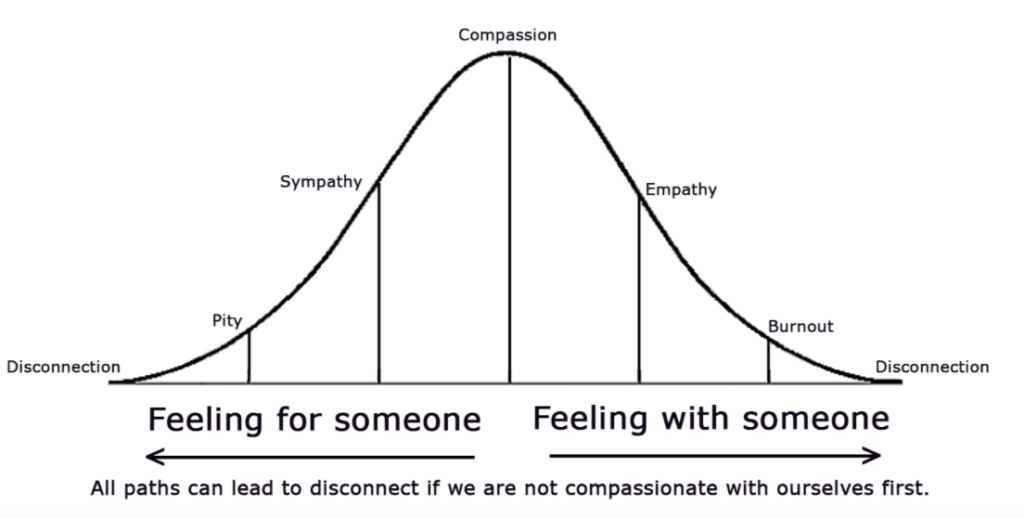Do you know you are an empath? Do you think of yourself as a compassionate person?
Psychiatrist Dr. Judith Orloff defines empaths as those who absorb others’ joys and stresses like emotional sponges. While it may seem this lends itself to treating others with compassion, the two are actually very different.
Compassion is about finding the balance between sympathy — feeling for someone — and empathy — feeling with someone. Empathy means you relate to someone else’s suffering or pain; you feel it as if it is your own. Sympathy enables you to feel for someone without feeling their pain and suffering yourself. As you can see below, at their extremes, both of these can lead to disconnection.

Compassion allows us to stay connected, understanding what others are going through and relating kindly to them. This allows for a more supportive connection. If someone’s pain and suffering is debilitating to them, how much support can you offer if you too are debilitated by what they are feeling?
Failing to shift from empathy to compassion can lead to empathy overload, leaving you feeling drained and depleted. So, the question becomes: how do you stay in the range of compassion when you know you are an empathic person? The answer: boundaries. Setting boundaries is more than just managing your schedule.
Let’s explore…
Boundaries in your own mindset
Try shifting your mentality about pain and hardship, viewing painful experiences as part of growth rather than something evil that happens. Seeing pain as part of growth takes away our need to fix the person who is struggling and allows them to be seen as broken-hearted yet whole.
When we shift from fixing, advice-giving, pitying, or judging, and instead begin validating their experience, we can stop carrying their pain as if it’s our own. You can acknowledge the pain, as a sign that you love and care for that person, and trust that this experience is part of their own journey of growth. It’s important to remember that this is a shift in YOUR mindset and not necessarily something appropriate to verbalize to the hurting person.
Boundaries in conversation
Do you ever find yourself in conversations where the primary focus is complaining or speaking ill of someone else? When you are an empath, these conversations can be energetically exhausting. You have the ability to manage the conversation with compassionate communication. Most people who are complaining just want to be heard. Acknowledge and validate their experience by saying, “Thanks for sharing. That sounds like a tough situation.”
As an empath, it’s easy to relate to them and even to try to solve their problems. However, if your energy is already depleted, it’s important to be emotionally honest and let them know. Try saying something like, “I don’t mind if you need to vent” (if that is true for you) “…and right now, I am emotionally drained.” If you feel comfortable in the relationship, try proposing my vent/gratitude exercise.
It goes like this…
Share with them that they will have one (up to five) uninterrupted minutes to let it out… share, vent, complain, shed what they need to. At the end of the time, you will say, “thank you for sharing your truth.” You won’t give advice or try to fix it for them. Then, you’ll set a timer for an equal amount of time, and they get to share gratitude for everything that is going well. At the end of the time, again, you will say, “thank you for sharing your truth.”
Boundaries with commitments
“No” can be a hard thing to say, especially to someone you care about. Instead, try on the phrase, “Yes and…” Meaning, find a way to say “yes” that is still within your boundaries. For example, if a friend who is going through a hard time asks you to come over, instead of saying, “I can’t today” try saying, “yes, I want to and I’m not available today. I can tomorrow. Could that work?” Plug in your desired availability. This phrase is a way of saying, “here is what I can do…” instead of just saying, “no.”
Remember a “no” to someone else is a “yes” to yourself. You are the only person who goes to bed and wakes up with yourself every day of your life. Having compassion for yourself means that you don’t abandon yourself for anyone else. It doesn’t mean that you can’t give your love and support, it just means that you do so with your own needs in mind.
Boundaries with your own feelings
There are some relationships that we hold so closely, we can’t avoid feeling what the other person is feeling. Maybe for you, that relationship is a child, a spouse, a sibling, or a life-long friend. Choosing compassion does not mean we have to avoid feeling the pain of others. It means we avoid carrying it as if it’s our own.
If you are feeling the pain of someone close to you, show yourself some compassion too. Find a safe way to feel your own feelings, even if that means finding someone else to support you (choose someone other than the person who is hurting). Acknowledging that what they are experiencing is part of their own growth and getting support when you feel it with them allows you to be more emotionally available for the person who is suffering.
Remember: when you are full, you can care for others more effectively.

